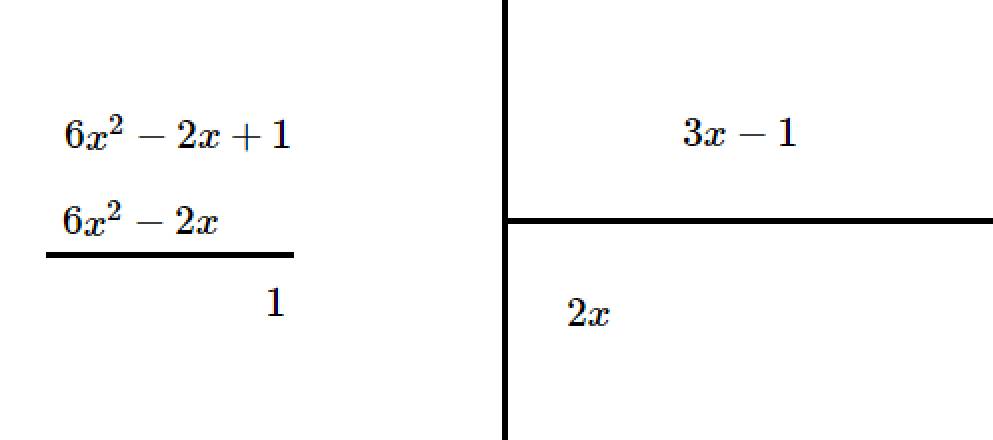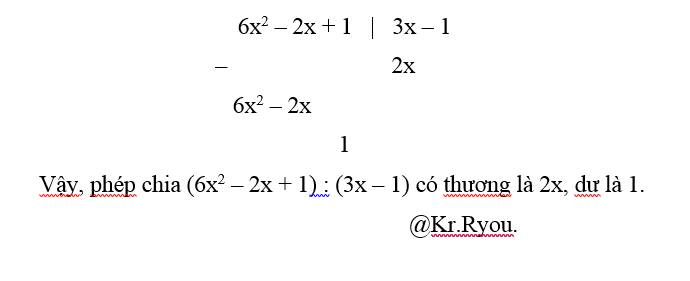
Hãy nhập câu hỏi của bạn vào đây, nếu là tài khoản VIP, bạn sẽ được ưu tiên trả lời.


\(6x^2-2x\left(3x+\dfrac{3}{2}\right)=9\)
\(\Rightarrow6x^2-6x^2-3x=9\)
\(\Rightarrow-3x=9\)
\(\Rightarrow x=\dfrac{9}{-3}\)
\(\Rightarrow x=-3\)
\(6x^2-2x\left(3x+\dfrac{3}{2}\right)=9\\ \Leftrightarrow6x^2-6x^2-3x=9\\ \Leftrightarrow3x=9\\ \Leftrightarrow x=3\)

 `6x^2-2x+1=(6x^2-2x)+1=2x(3x-1)+1`
`6x^2-2x+1=(6x^2-2x)+1=2x(3x-1)+1`
`->` Thương của phép chia `6x^2-2x+1` cho `3x-1` là `2x` và có số dư là `1`

d. A(x) = M(x) + 2N(x)
= 10x3 + 5x2 - 4x - 1 + 2(x2 - 9)
= 10x3 + 7x2 - 4x - 19 (0.5 điểm)
Thay x = 1 vào biểu thức ta có: A(1) = -6 (0.5 điểm)

Đặt \(6x^2+2x+2=0\)
\(\text{Δ}=2^2-4\cdot6\cdot2=4-48=-44< 0\)
Do đó: Phương trình vô nghiệm

15 \(\times\) ( 2\(x\) - 16) - (6\(x^2\) + 15\(x\)): 3\(x\) = 20
15 \(\times\) (2\(x\) - 16) - 3\(x\)( 2\(x\) + 5):3\(x\) = 20
30\(x\) - 240 - (2\(x\) + 5) = 20
30\(x\) - 240 - 2\(x\) - 5 = 20
28\(x\) - 245 = 20
28\(x\) = 20 + 245
28\(x\) = 265
\(x\) = 265:28
15(2x-16)-(6\(x^2\)+15x):3x=20
=>30x-240-2x-5=20
=>28x=265
=>x=\(\dfrac{265}{28}\)

a: \(A=-5x^3+9x^3-2x^2-2x^2+x-x+1\)
\(=4x^3-4x^2+1\)
\(B=-4x^3+2x^3-2x^2+2x^2+6x-9x-2\)
\(=-2x^3-3x-2\)
\(C=x^3-6x^2+2x-4\)
b: \(A\left(x\right)+B\left(x\right)-C\left(x\right)\)
\(=4x^3-4x^2+1-2x^3-3x-2+x^3-6x^2+2x-4\)
\(=3x^3-10x^2-x-4\)

a: \(P\left(x\right)=-5x^3+3x^2+2x+5\)
\(Q\left(x\right)=-5x^3+6x^2+2x+5\)
b: Q(x)-P(x)=6
\(\Leftrightarrow-5x^3+6x^2+2x+5+5x^3-3x^2-2x-5=6\)
=>3x2=6
hay \(x\in\left\{\sqrt{2};-\sqrt{2}\right\}\)

\(\dfrac{6x^2-2x+1}{x-1}\)
\(=\dfrac{6x^2-6x+4x-4+5}{x-1}=6x+4+\dfrac{5}{x-1}\)